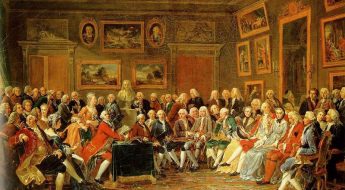Part 4.6 is the final part of Chapter 4.
A Childhood at Versailles consists of the first 5 chapters of the memoirs of Mme de Boigne (1781-1866), née Adèle d’Osmond, who was a French salon hostess and writer. She was born in the Château de Versailles and lived at the court of Louis XVI and Marie-Antoinette until her family fled to England during the Revolution. Later in her long life, she married a rich soldier of fortune 30 years her senior, hosted a brilliant salon in Paris, and became an intimate of the last French queen, Marie-Amélie, consort of King Louis Philippe (r. 1830-1848). Childless herself, Mme de Boigne addressed her memoirs to her grandnephew. The memoirs were not published until 1907, under the title Récits d’une tante, or An Aunt’s Tales. They’ve never been published in English, as far as I know, so I’ve decided to translate the first 5 chapters, the ones that take place mainly at Versailles, and post them here on this blog for interested readers to enjoy for free.
The chapters are quite lengthy, so I’ve broken each one into several parts. In Part 4.6, the fraught relations between the confined sovereigns in Paris and the émigrés in Coblentz, who were lead by the King’s brothers, are laid bare.
A Childhood at Versailles, Chapter 4, Part 6 (4.6)
I have said the King was strongly opposed to the initiatives that the Comte d’Artois was taking in his name. This opposition did not diminish after Monsieur joined his brother, and the prisoners of the Tuileries were in a state of complete hostility to the leaders at Coblentz.
The Queen, with the King’s approval, kept up a correspondence of which the Baron de Breteuil, then at Brussels, was the principal agent, and of which the primary goal was to prevent foreign governments from a lending a hand to the princes’ intrigues. It was for that reason hidden from Madame Élisabeth, who leaned towards her brothers’ opinions. The upshot was that, even within that sad palace, confidentiality was not complete.
My father was the intermediary of the Queen’s correspondence with M de Breteuil. He took her letters to M de Mercy. Sometimes, when it was feared that too frequent visits would attract attention, it was Bermont who went to receive them from the Queen’s hands. My father maintained with certainty that sixty thousand francs had been offered to him to hand over these papers. If he had handed over one of these letters of the Queen, which he was in a position to do, he would certainly have been able to sell it for a high price.
The royal family’s situation became more and more intolerable with each passing day. The King finally consented to recognize and swear an oath to the Constitution. Those who accuse him of weakness should put themselves in his place before condemning him. My father never permitted himself to do so, but he strongly disapproved of the plan that was followed, by which the King was to place every conceivable obstacle in the way of the Constitution that he had just accepted.
“Since you have sworn to it, Sire,” he said, “it must be followed loyally and sincerely, and implemented in every way that is dependent on you.”
“But it cannot work.”
“Well, then, it will fall apart, but it must not be by your doing.”
In this new predicament, my father loudly decried the Queen’s correspondence with Brussels. She seemed to listen to him and to accommodate herself to his opinion, but she found another agent. She kept only this from my father, without harbouring any ill will against him, nor withdrawing her confidence in him on other matters.
These poor sovereigns did not want to follow anyone’s views completely, but nonetheless welcomed and partially accepted all that were given to them. The result was that there was a disconnect in their conduct that was easily translated into falsity in the eyes of their enemies and cowardice in the eyes of their so-called friends on the banks of the Rhine, for it must not be forgotten that Coblentz was as fatal and almost as hostile to Louis XVI as the Jacobin Club.
The mission that my father was to have fulfilled if the King’s flight had succeeded was canceled by the arrest at Varennes. He asked permission of His Majesty to resign from his St. Petersburg post. In his opinion, the King, having accepted the Constitution, should only be served by what were called patriots, people who had the reputation as well as the willingness to be attached to it. My father, a prominent aristocrat, though as moderate as could be, was nothing more than an encumbrance, and he voiced his intention to go join my mother in Rome.
The King authorized him to do so, adding that when the time for honest men and faithful subjects returned, he would know where to find him. He thanked him for not planning to go to Coblentz. The Queen, above all, insisted a great deal that he take the road for Italy.
“You are ours, Monsieur d’Osmond, and we want to keep you.”
The King with his good sense had understood all the dangers of emigration such as existed in Germany, and my father was too much of the same mind to be tempted to go there. In any case, he would probably have been badly received, for all those who at the risk of their lives were devoted to the King’s service were not looked on favourably by his brothers, above all by the Comte d’Artois, who, at that time, was taking the lead. Monsieur’s craftier character kept him to a more reserved stance as long as the King was alive.
My father still remained for some time in Paris. In the last interview that he had with the King, the latter gave him a brevet for a pension of twelve thousand francs from his privy purse.
“I am not very rich, but you are not very greedy; we will perhaps find ourselves in times when I can make better use of your ardour and reward it more fittingly.”
The state of my mother’s health, which was becoming more alarming, finally decided my father to tear himself away from the Tuileries, where he did not want to stay but could not bring himself to leave. He arrived in Rome in the spring of the year 1792.
To the sadness that political events caused him was added that which resulted from the loss of his brother, the Abbé d’Osmond, a young man with the greatest expectations. He had gone to Saint-Domingue in 1790 with the thought of conserving our properties there, and to prepare a retreat for our family if France became uninhabitable. He played a very honourable role at the beginning of the insurrection in Saint-Domingue, but, having fallen into the hands of the Negroes, he was cruelly massacred.
My father had retained the Vicomte d’Osmond at the head of the Neustrian regiment, which he commanded in Strasbourg, for as long as he was in France. However, after his departure, the Vicomte, accompanied by all the officers of the regiment, when to join the Army of the Princes.
This concludes Chapter 4. In Chapter 5, which will be the final chapter of A Childhood at Versailles, Mme de Boigne and her parents go to stay at the Court of Naples before eventually returning to England.

















Leave a Comment